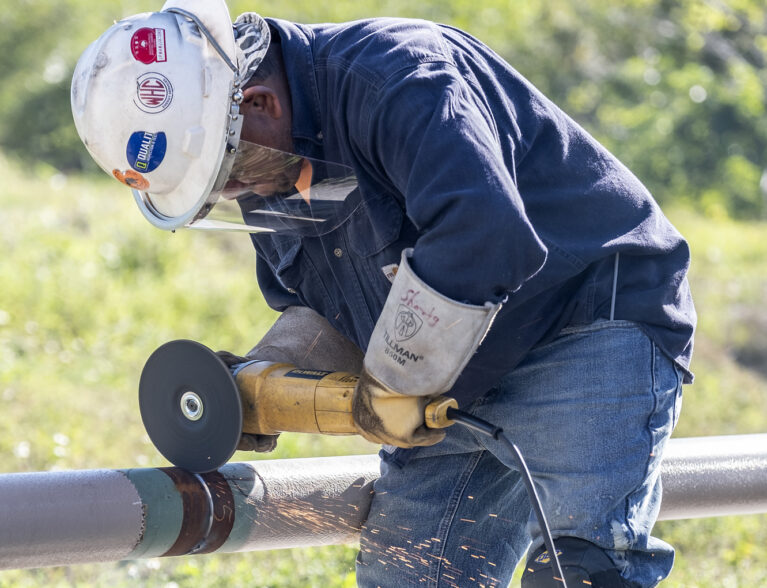
Now that Florida City Gas has begun running natural gas pipes to homes within the island’s gated communities, property owners will soon face hook-up decisions that include converting appliances and safely mothballing underground propane tanks that run whole-house generators.
In fielding questions from the Indian River Shores Town Council, Florida City Gas Senior Service Advisor Tim Knutson said there’s no one right answer for everybody. While some homeowners may have expensive, modern appliances that can be converted from propane to natural gas, others may wish to greet the introduction of natural gas to the island by upgrading to new appliances.
“Every house is different. Every appliance is different depending on age. With some newer ranges, it’s just a matter of switching out the regulator.”
Knutson said Florida City Gas will pair residents up with a licensed contractor qualified to do the conversions. “We bring them in to meet with the customer to discuss what those costs are going to be. We have some rebate money that’s available to offset some of those costs.”
Crews have run pipes throughout about one-third of Windsor on the west side of A1A and Windsor oceanside is now completely piped for gas. Marbrisa and The Estuary are in the works, and The Strand and Seaglass had natural gas piped-in as part of the development plan as the homes there are new construction.
Roughly 95 percent of the work is done under the roadways, and it takes about two weeks to run pipes throughout a typical gated community, Knutson said. “They do about 500 feet a day, depending on what kind of obstructions they find,” he said.
“We’ve had a very good response from local residents,” Knutson said. He said he works with Homeowner Associations and Property Owner Associations to get permission to serve the community, and once at least 50 percent of the community is on board with signing up for gas service, Florida City Gas will make a plan to run the pipe, using existing utility easements.
“One thing I discuss with the HOAs is we’re going to come in when they’re ready for us to come in. We’re not going to come in the middle of January and start putting gas pipe in the ground unless they want us to come in. It’s going to be up to them on when we’re going to be able to do it. We’ll work our schedule around what they want us to do,” Knutson said.
Regarding the underground propane tanks many island residents have to power whole-house generators, Knutson said what’s involved in switching over depends upon whether or not the property owner owns the tank itself.
If the homeowner owns the tank, the state-approved way to handle it is to have the propane removed and then fill the tank with water and cap it off. If the tank belongs to the propane gas vendor, the property owner would need to contact them to find out if they want it back, or how much it might cost to keep it. Most times, Knutson said, the propane vendor will not want the trouble of digging up the tank, but it is a possibility. It might depend upon the age of the tank.
Florida City Gas executed an easement agreement last month with the Town of Indian River Shores to put a regulator station in the town to convert the gas pressure coming in from the Peninsula Pipeline main line to a lower, safe pressure that’s appropriate for supplying homes and businesses in the town.
The regulator station comes in pre-built, but crews would need to clear the Brazilian Peppers from the site and level it, leaving a vegetative border for aesthetic purposes. The gas supply line is already in place and ready to connect to the regulator station. The whole process should take a few weeks, and is not expected to impact traffic through the town in any way.
Florida City Gas General Manager Kurt Howard also addressed the purchase of Florida City Gas in late September by Chesapeake Utilities Corporation, which agreed to pay Florida Power & Light parent NextEra Energy $923 million. The purchase of Florida City Gas doubled Chesapeake’s gas business in Florida.
“The great thing about this acquisition of Florida City Gas, from your perspective is you will hardly see anything – nothing at all – change,” Howard said, explaining that everything from the employees to the contracts had been taken over by Chesapeake.
“We’ll still be Florida City Gas so you’ll still get to deal with the same folks in the town that you did previously. Regarding Chesapeake, under their ownership I expect nothing different. They’re a utility that has, through their affiliates, over 150 years in natural gas service in the United States. They’ve been in Florida as long as Florida City Gas has.
They’ve invested hundreds of millions of dollars in their infrastructure for their local distribution companies.
“We expect the same level of commitment from Chesapeake as we’re accustomed to.”



